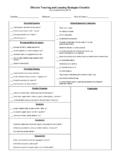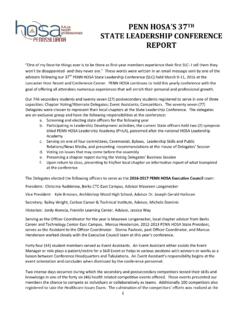Transcription of The Ten Roles of Coaches - PA Career Tech
1 The Ten Roles of Coaches Joellen Killion, Deputy Executive Director Resource Provider As a resource provider, the coach assists teachers with materials, tools, information, etc. to support classroom instruction. The resources provided could be links from the Internet, materials shared from other teachers, wonderful research/articles that are relevant to teacher practices or ideas shared from other colleagues. Oftentimes, providing these resources help Coaches cross the threshold into classrooms. Data Coach Coaches are the liaisons between research and practice, helping teachers learn to improve their practices in a reflective supportive setting. As a data coach, the coach organizes and analyzes a school s data, facilitating conversations among the faculty. The coach supports teachers and administrators in using data to improve instruction on all levels.
2 Curriculum Specialist The coach supports teachers by helping with the what of teaching. He/she helps teachers use the national, state and district curriculum standards to plan instruction and assessment. The coach collaborates and supports teachers in using the curriculum to analyze students strengths and target areas for improvement. Coaches need to understand how each curriculum is structured, , thematic approaches, etc., and validate the content teachers expertise. The coach taps into the content expertise of the classroom teacher. Instructional Specialist The coach supports teachers by helping with the how of teaching. He/she collaborates with teachers in designing instruction to meet the needs of all students. Multiple instructional strategies/processes are shared with teachers.
3 The coach also coordinates with other specialists in the school to provide a seamless approach to the educational processes in the school, supporting the idea that literacy is a process, not content. The coach must maintain confidentiality and be responsive to the territorial limitations of teachers classrooms. Mentor As a mentor, the coach is a critical friend supporting all teachers, novice and experienced. He/she provides guidance and structure where needed, encouraging relationship building among colleagues. A mentor focuses on teachers strengths, collaborating and discussing common issues of concern and is a shoulder to bounce off ideas and concerns. Classroom Supporter As a classroom supporter, a coach is a co-planner, a co-teacher and a feedback provider.
4 The role is varied including co-planning units of study, providing over the shoulder coaching, participating in co/team teaching, modeling lessons, encouraging reflective practices, assisting with small group instruction, helping with assessments, co-creating classroom management techniques which support instruction and facilitating after visitation discussions. The coach helps facilitate discussions resulting in the collaborative, reflective, accountable, self-evaluative and participative practices that support the educational processes of all students and teachers. Learning Facilitator As a learning facilitator, a coach helps coordinate and facilitate learning experiences for school staff. A coach engages teachers in inquiry, collaborates with teachers to determine areas of need and together they design ways to address the issues of concern.
5 Coaches coordinate cross department classroom visitations, organize professional learning communities within and among schools, help manage study groups, design professional development opportunities, arrange lesson study groups, discuss case studies and examine student work. A coach helps provide opportunities for professional growth on all levels. School Leader A coach as a school leader assists and serves on leadership teams within the school. He/she helps bridge the gaps between and among school programs, remaining focused on the school goals. The coach helps align individual goals and school goals in a non-evaluative way. The coach is not an administrator, a district overseer nor a classroom peer. Catalyst for Change A coach models and facilitates continuous improvement on the classroom and school levels.
6 On many occasions, he/she challenges the status quo, asks questions and facilitates difficult conversations helping to shape the culture of the school. As a catalyst for change, the coach must motivate the teachers and encourage them to step out of the box, reinforcing their learning s with support. A coach helps teachers retain what they learn through practice and helps teachers transfer/synthesize their learning by co-planning ways to use the information in new settings. Learner In the role of learner, the coach models continuous learning. The coach takes initiative and pursues her/his own learning that focuses on her/his work, her/his own need, and the field of education. Coaches reach out to create learning communities both within and outside the school. The coach, as learner, uses reflection on and of practice, is aware of the needs of the adult learner, understands the learning process, provides opportunities for proactive support, and leads others as they journey toward changing their knowledge, attitudes, skills, aspirations, and behaviors.
7 The coach is a thought leader in the school What instructional Coaches do Instructional Coaches are on-site professional developers who teach educators how to use proven instructional methods. To be successful in this role, Coaches must be skilled in a variety of Roles , including public relations guru, communicator extraordinaire, master organizer and, of course, expert educator. Marketing their services Instructional Coaches hold brief meetings with teams of teachers to explain their goals, philosophy, kinds of interventions available, and the support they can provide. They allow time for questions and provide a means for teachers to indicate they are interested in working with the coach. Analyzing teachers' needs Instructional Coaches meet with teachers individually at a convenient time for the teacher (such as during a planning period or after school) to identify the teacher's most pressing needs and to discuss possible research-validated interventions that might help the teacher address those needs.
8 Observing classes Instructional Coaches sit in on classes taught by the collaborating teacher to observe the overall progress of the class as well as behaviors related to specific issues raised during the individual coach-teacher conferences. Collaborating on interventions Together, instructional Coaches and teachers identify interventions that best address the teacher's most pressing need. As an example, an instructional coach and teacher might determine that a graphic device could help the teacher clearly organize and communicate the standards and content that will be taught in a unit. When necessary, instructional Coaches and teachers collaborate to develop a plan for using the chosen instructional method. Preparing materials The instructional coach's goal is to make it as easy as possible for a teacher to successfully use a new instructional method.
9 To that end, instructional Coaches try to alleviate the burden on teachers as much as possible by preparing all handouts, assessments, overheads, and other materials that the teacher needs. Modeling As teachers observe, instructional Coaches teach their classes and demonstrate how the new instructional method or intervention should be taught. In some cases, instructional Coaches provide checklists or some other form of observation tool so teachers know to watch for specific teaching behaviors. Observing Instructional Coaches observe teachers as they use the new intervention in class. Sometimes, the instructional coach uses a checklist or some other form of observation tool as a means of providing specific feedback to the teacher. Feedback-modeling-observing-feedback The nature of the instructional coaching process allows for continuous communication between instructional Coaches and teachers.
10 After the first observation , instructional Coaches meet with teachers to discuss how teachers used the intervention. Coaches provide plenty of validation along with suggestions for improvement. The communication then continues, with instructional Coaches modeling, observing classes, and providing more feedback, depending on the needs of the teacher. Building networks for change Instructional Coaches work with groups of teachers to establish teams or professional learning communities that pave the way for interventions to be taught consistently across classrooms and subject matter. An instructional coach might help a language arts team develop a scope and sequence for teaching writing strategies, for example, or a grade-level team develop a plan for teaching the same behavioral expectations for students in all classes.

